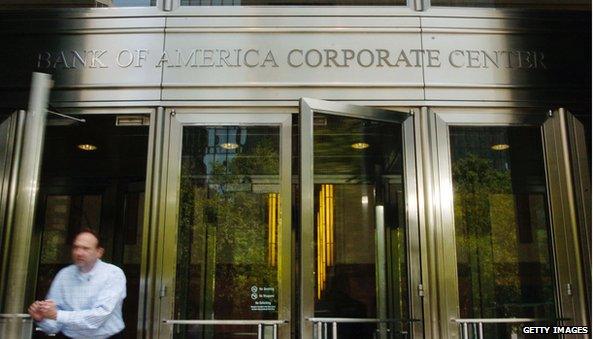Bank of America's Countrywide to pay $1.3bn to US
- Published

The decision comes as investors are waiting to hear about a potential settlement with the US government
Bank of America's Countrywide business must pay the US government $1.3bn (£769m) for selling defective home loans, a New York judge has ruled.
Countrywide was found guilty of selling bad loans, as part of a programme called "hustle", to US mortgage giants Fannie Mae and Freddie Mac in 2007.
In October, a judge found the bank liable on a fraud charge but did not decide a penalty.
Former Countrywide executive Rebecca Mairone must also pay $1m.
"We believe that this figure simply bears no relation to a limited Countrywide programme that lasted several months and ended before Bank of America's acquisition of the company," Bank of America spokesperson Lawrence Grayson told the BBC.
Bank of America bought Countrywide at the urging of the US regulators during the financial crisis in 2008.
"We're reviewing the ruling and will assess our appellate options," said Mr Grayson.
Bank of America has spent nearly $40bn on legal matters relating to the housing market collapse, and the bank is expected to announce a multi-billion dollar settlement with US regulators over similar charges in the coming weeks.
Whistleblower suit
The "hustle" suit came about after Edward O'Donnell, a former Countrywide executive, issued a whistleblower complaint alleging fraud.
Mr O'Donnell said a programme Countrywide instituted in 2007 known internally as the "high-speed swim lane" (also known as "HSSL" or "hustle") did not properly screen mortgage applications, and that employees - who were paid based on loan volume and speed of processing - were give incentives to approve loans.
The programme was overseen by Ms Mairone.
After investigating, the US government found that 43% of the loans sold via the hustle programme to the US government were defective in some way.
Investors - perhaps used to a near steady stream of settlements - did not react strongly to news of the penalty.
Shares in Bank of America were trading slightly higher at midday.